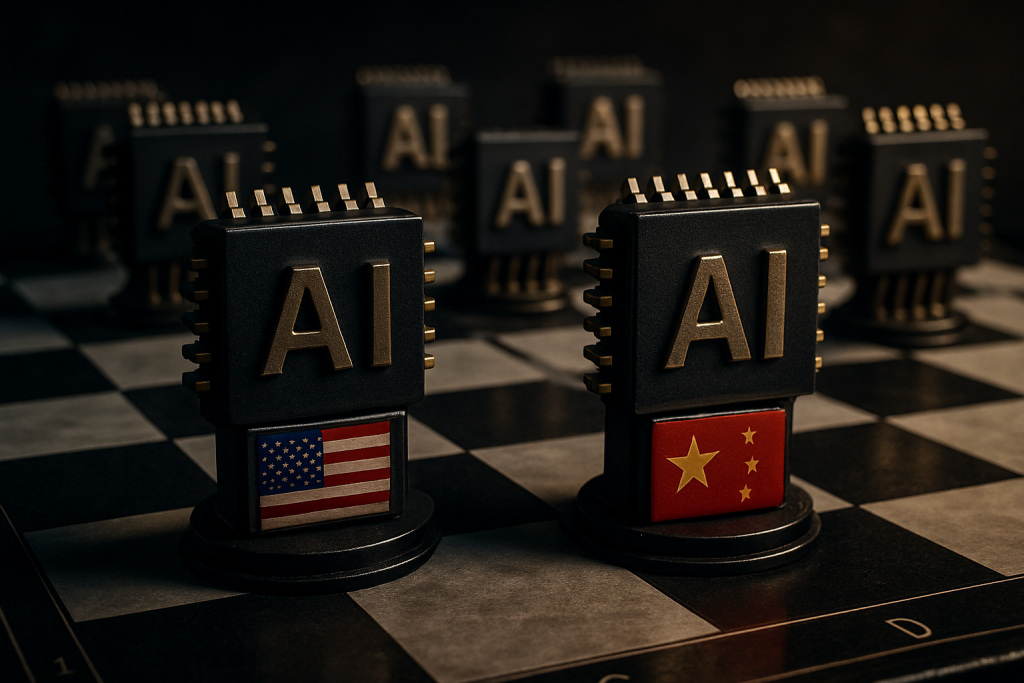The year is 2025. Remember those halcyon days of 2020 when a TikTok dance craze was the biggest geopolitical concern? Yeah, good times. Now, the stakes are a tad higher. According to a report in the Financial Times this week, China has formally requested the United States to ease export controls on those oh-so-precious components that make up AI chips. This isn’t just about faster streaming of cat videos, folks; this is about the future of everything.
Think of it like this: AI chips are the brains of the operation, the neural networks that power everything from self-driving cars to personalized medicine to, well, potentially Skynet (let’s hope not). And right now, Uncle Sam has a pretty tight grip on who gets to buy them. China wants that grip loosened, and they’re making it a key bargaining chip (pun intended, naturally) in upcoming trade negotiations. It’s all happening ahead of a potentially pivotal summit between President Trump (yes, still!) and President Xi. This isn’t just about trade; it’s about technological dominance.
So, how did we get here? This saga is less a single event and more a slow-burn thriller, a techno-Cold War playing out in silicon valleys around the globe. For years, China has been aggressively investing in its AI capabilities, aiming to become the world leader in this transformative technology. They see AI as the key to economic prosperity, military superiority, and, let’s be honest, global influence. The US, understandably, isn’t thrilled about handing over the keys to the kingdom. The existing export controls are designed to slow down China’s progress, preventing them from acquiring the most advanced chips needed to train cutting-edge AI models. It’s a bit like trying to win a Formula One race with a souped-up minivan. You might get somewhere, but you’re not going to be on the podium.
The implications of this request, and its potential outcome, are massive. Let’s break it down:
The Tech Specs (Relatively Speaking)
We’re not talking about the chips in your toaster oven. These are specialized processors, often GPUs (Graphics Processing Units) or even more exotic architectures designed specifically for the intense computational demands of AI. Training a large language model, for example, requires massive parallel processing power. Imagine teaching a child every book ever written, but doing it in a matter of days. These chips are designed to handle those kinds of workloads. Companies like NVIDIA and AMD are key players in this market, and their technology is subject to strict export controls to prevent it from falling into the wrong hands (or, more accurately, into competing AI labs).
Who’s Affected? Pretty Much Everyone.
Okay, maybe not your grandma who still uses a flip phone, but almost everyone else. First and foremost, the obvious players: the semiconductor industry. Companies like NVIDIA, AMD, and Intel are caught in the crossfire. Loosening export controls could open up a massive market in China, but it also risks fueling the rise of a powerful competitor. Then there are the AI companies themselves, both in the US and China. Chinese AI firms would benefit immensely from access to more advanced chips, allowing them to develop more sophisticated AI models. U.S. companies, while potentially gaining market access, could face increased competition. And then there’s the rest of us. AI is rapidly permeating every aspect of our lives, from healthcare to finance to entertainment. The outcome of this chip war will shape the future of AI and, consequently, the future of society.
Political and Societal Ripples
This isn’t just about chips; it’s about power. The request for relaxed export controls is a symptom of a larger geopolitical struggle for technological dominance. The US and China are vying for leadership in AI, and the outcome will have profound implications for the global balance of power. Think of it as the space race of the 21st century, but instead of rockets and satellites, we’re talking about algorithms and neural networks. There are also important societal considerations. As AI becomes more powerful, it raises questions about job displacement, algorithmic bias, and the potential for misuse. A more technologically advanced China could accelerate these trends, potentially exacerbating existing social and economic inequalities.
Ethical Quandaries in Silicon
Let’s get philosophical for a moment. Are we building AI for the benefit of humanity, or are we building it for the benefit of specific nations or corporations? The development of AI raises profound ethical questions about control, autonomy, and the very nature of intelligence. Should access to powerful AI technologies be restricted? If so, who gets to decide? And how do we ensure that AI is used responsibly and ethically? These are not easy questions, and they require a global conversation involving governments, industry leaders, and, most importantly, the public.
Show Me the Money: The Economic Impact
The financial implications are staggering. The AI chip market is already a multi-billion dollar industry, and it’s only going to grow. Loosening export controls could create new economic opportunities, but it could also disrupt existing markets and create new winners and losers. U.S. companies might see a short-term boost in revenue, but they could also face increased competition from Chinese firms in the long run. The overall impact on the global economy is difficult to predict, but it’s safe to say that it will be significant. Expect stock prices to fluctuate, venture capital to pour into AI startups, and a whole lot of lobbying in Washington and Beijing.
In conclusion, China’s request to relax chip export controls is more than just a trade negotiation tactic. It’s a strategic move in a high-stakes game that will shape the future of technology, geopolitics, and society. Buckle up, folks. The ride is just beginning.
Discover more from Just Buzz
Subscribe to get the latest posts sent to your email.


